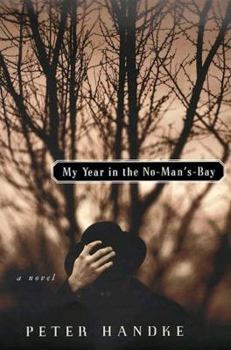My Year in the No-Man's-Bay
Select Format
Select Condition 
Book Overview
Nobel Prize winner Peter Handke's autobiographical novel My Year in No-Man's Bay is a meditation on two decades of a writer's life culminating in a solitary, sobering year of reckoning (Publishers... This description may be from another edition of this product.
Format:Hardcover
Language:English
ISBN:0374217556
ISBN13:9780374217556
Release Date:January 1998
Publisher:Farrar Straus Giroux
Length:468 Pages
Weight:1.80 lbs.
Dimensions:1.4" x 6.4" x 9.3"
Customer Reviews
1 rating
The Tale is the Teller
Published by Thriftbooks.com User , 23 years ago
Austrian novelist, playwright and screenwriter Peter Handke is someone who seeks to alienate his work from the artificiality of life; in doing so his work, itself, becomes rather alienating.Handke first gained attention in 1966 when he denounced Günter Grass and Heinrich Boll for, as he saw it, compromising the novel by making it a vehicle for social criticism. Like many French writers, Handke believed that novelists should register conscious experiences only, and then render them as austerely as possible.Handke is a novelist who never creates a character. Instead, he folds his characters into his prose. He never constructs a real plot. Instead, he chronicles the very plotlessness (and pointlessness) of life. Handke finally decided that writers had their own personal stories to tell rather than telling those of the characters they made up. His novel, The Afternoon of a Writer told the story of, the afternoon of a writer. No more, no less.My Year in the No-Man's Bay is the sequel to The Afternoon of a Writer. Although many readers may find this novel's content to be less-than-stimulating, I don't think anyone could say its structure is less-than-breathtaking.The protagonist is a fifty-five year old writer who attempts to recall a year long artistic and spiritual metamorphosis. This writer is poetically named Gregor Keuschnig, and is known only as Gregor K. (Those who are at all familiar with Handke will immediately recognize this as a jab at Kafka, one of Handke's least favorite authors.) Gregor, who is obviously Handke's alter-ego, has grown disenchanted with both city life and country life and has moved to the suburbs of Paris instead. The city and the countryside, says Gregor, have been much overused as the setting in more traditional novels.Throughout the book, Gregor uses the French word, banlieue, for suburb. But banlieue could also mean "place of the outlaws," and, as such, it represents for Gregor, a chance to mine new linguistic and narrative terrain; a sort of "no-man's bay," a nameless body of water. (Apparently American writers who are notorious for setting their novels in the suburbs, John Updike, in particular, have escaped Handke's notice.)Gregor first writes at length about the difficulties and problems all writers face, bringing us right up to the year of his metamorphosis in the suburbs which is what he really wants to describe in the first place. He has a very difficult time doing so, however, as he gets bogged down time and again in what he calls "prehistories."The novel's last section, The Day, is a section in which Gregor collapses all time together. His year of metamorphosis, we come to realize, could be the year he is writing about or the year he is writing in or the year in which one of his "stories" takes place. It is up to the reader to decide.Life, itself, intrudes on Gregor's writing abilities until his novel and his life become one and the same, inseparable. What he visualizes as being of no conseque





